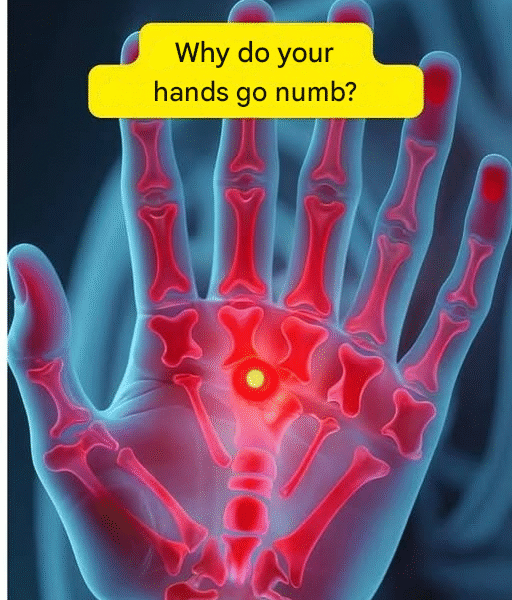Why Do Your Hands Fall Asleep? 🤲 Reasons You Shouldn’t Ignore This Common Symptom
We’ve all experienced it — that tingling, numb feeling in your hand that makes it seem like it’s “asleep.” It can be a strange and sometimes uncomfortable sensation. You might shake your hand or move your arm around to “wake it up,” and most of the time, it goes away.
But what if it happens frequently or without warning? That’s when you might need to pay closer attention.
Hand numbness or tingling can sometimes be your body’s early warning sign — and in some cases, it can point to an underlying health issue that needs attention.
🤔 What Does It Mean When Your Hands Fall Asleep?
That “pins and needles” feeling is called paresthesia, and it typically happens when pressure is applied to a nerve or blood flow is restricted. When this happens temporarily, it’s usually harmless. But if it’s frequent or happens without obvious cause, it could be due to something more serious.
🚨 Reasons You Should Pay Attention to Hand Numbness
1. Nerve Compression (Like Carpal Tunnel Syndrome)
One of the most common causes of hand numbness. Carpal tunnel affects people who:
- Use keyboards and mouse frequently
- Perform repetitive hand motions
- Experience wrist strain
Symptoms: Numbness in the thumb, index, and middle finger — especially at night.
2. Pinched Nerve in the Neck or Spine
When nerves that run from your neck to your hands are compressed (like in cervical radiculopathy), your hands may tingle or go numb.
Other signs: Neck pain, shoulder stiffness, weakness in the arm.
3. Diabetes or Pre-Diabetes (Peripheral Neuropathy)
High blood sugar over time can damage small nerves, especially in the hands and feet.
Watch for: Burning, tingling, or numbness — often starting in the fingers or toes.
4. Vitamin Deficiencies (Especially B12)
A lack of vitamin B12 can lead to nerve damage and result in tingling hands and feet.
Other signs: Fatigue, memory problems, balance issues.
5. Poor Circulation
If blood flow is restricted (due to heart conditions or blocked vessels), the hands might feel cold or numb.
Also look for: Swelling, bluish color, or pain in the arms or legs.
6. Multiple Sclerosis (MS) or Neurological Disorders
Though rare, numbness can be an early symptom of neurological conditions like MS.
Other signs: Blurred vision, balance problems, muscle weakness.
7. Stroke or Mini-Stroke (TIA)
Sudden numbness or weakness — especially on one side of the body — could be a sign of a medical emergency.
Seek immediate help if: The numbness is sudden and paired with difficulty speaking, dizziness, or facial drooping.
🩺 When to See a Doctor
You should consult a healthcare professional if:
- The numbness is frequent or long-lasting
- It’s affecting both hands regularly
- It occurs suddenly or without pressure on your arm
- It’s accompanied by pain, weakness, or coordination issues
Getting a proper diagnosis can help prevent further nerve damage or address serious health concerns early.
🧘♀️ What You Can Do at Home
- Adjust your posture — Avoid sleeping or sitting on your arms
- Take breaks from repetitive tasks or computer work
- Stretch regularly to release nerve tension
- Stay hydrated and maintain a balanced diet (especially with B vitamins)
- Consider using wrist supports or ergonomic tools if you work at a desk
🌿 Final Thoughts
While an “asleep” hand once in a while isn’t usually a big deal, repeated or unexplained numbness is your body’s way of saying something might be wrong. Don’t ignore the signs — early action can make all the difference.
Taking care of your nerves, posture, and overall health can help you avoid serious problems down the road.
If you found this helpful, please like and share this post with your friends and family! 👐✨
You never know who might need this information and could benefit from catching the warning signs early.
